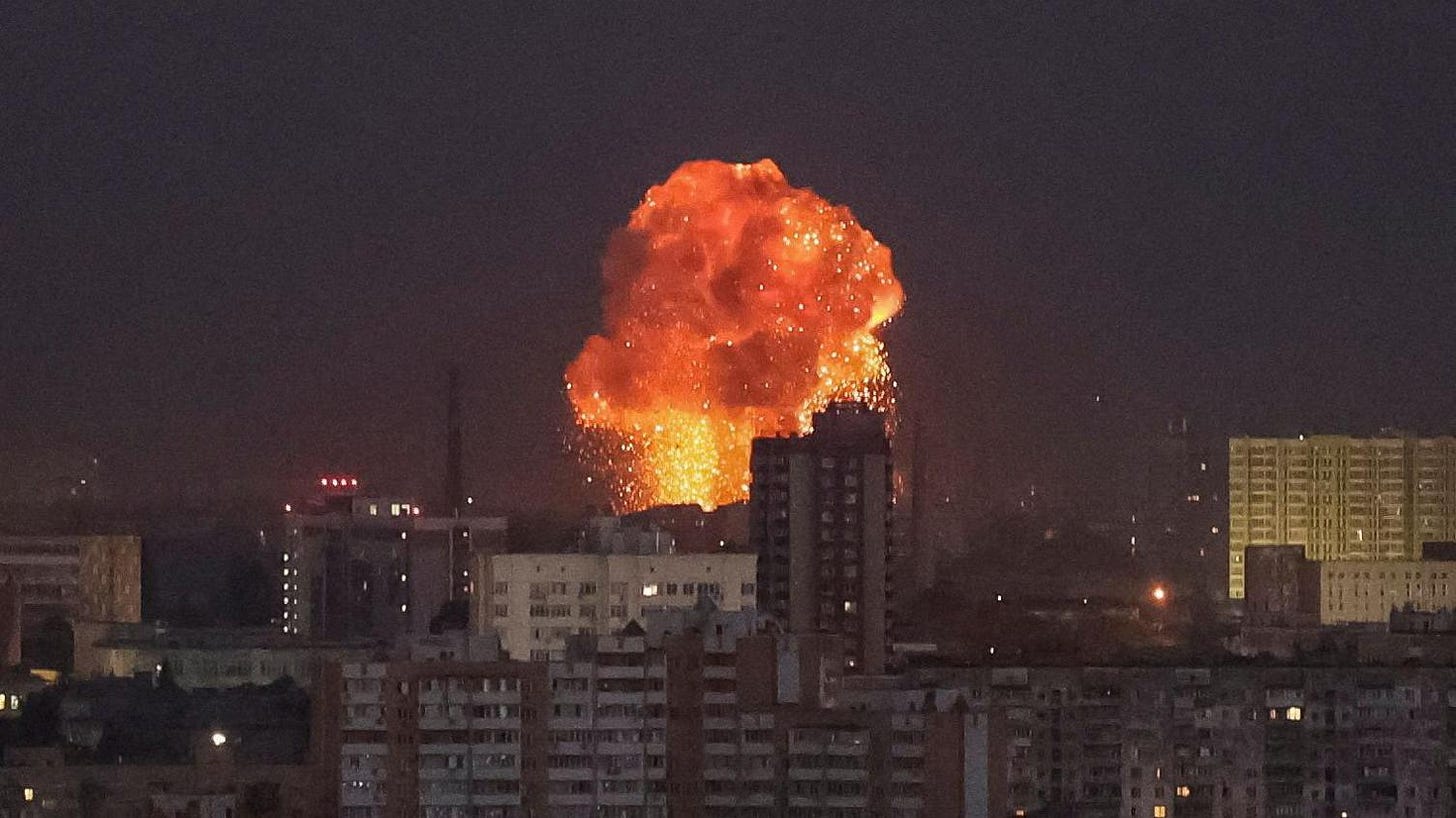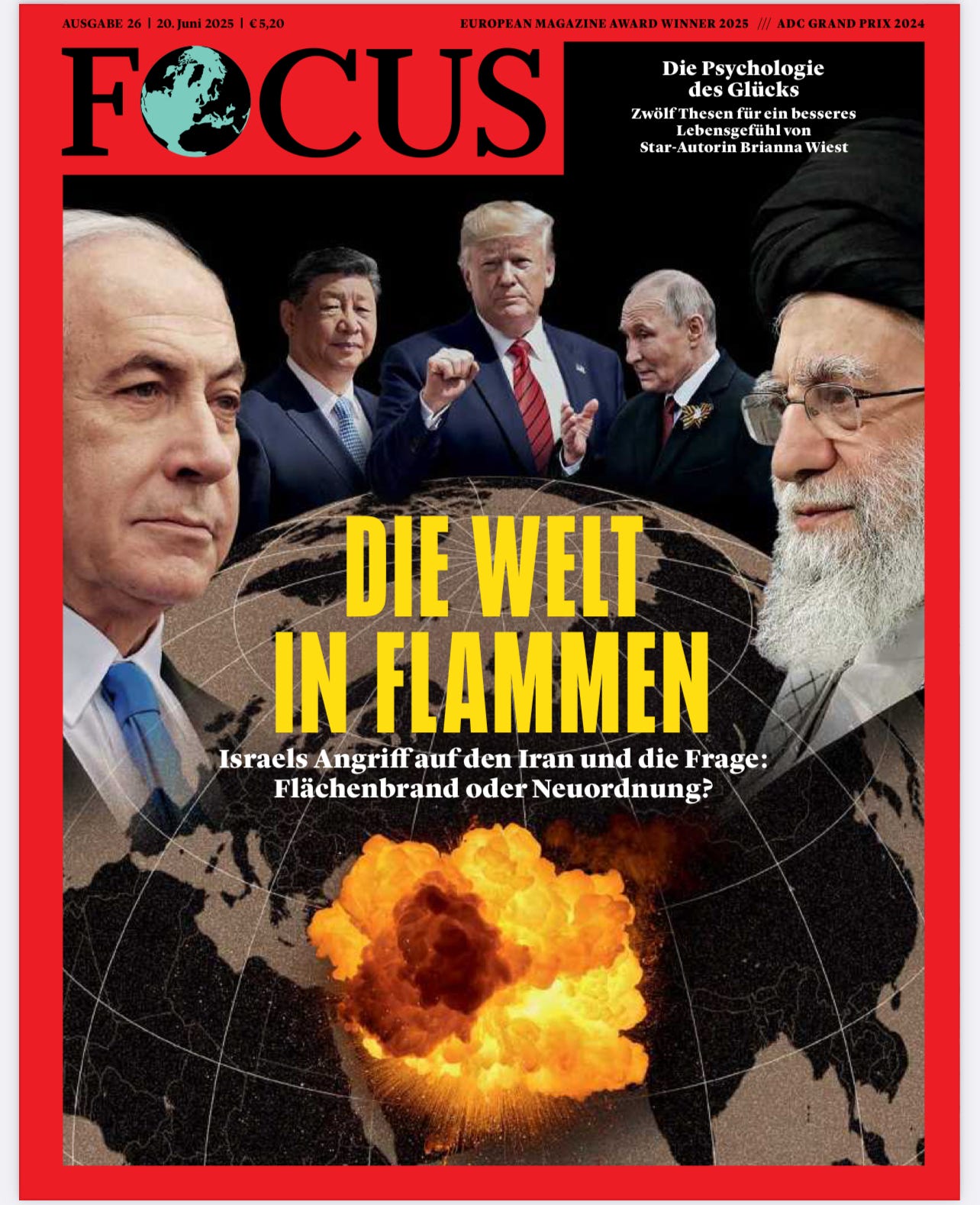As the World Averts Its Gaze, Putin Intensifies Assault on Ukraine
While global attention shifts to the Middle East, Russia steps up its brutal offensive—raining missiles on Ukrainian cities and testing the West’s fading resolve.
A ceasefire appears to have taken hold between Israel and Iran, with both nations acknowledging that it is in place. It follows an angry intervention by US President Donald Trump who earlier accused both sides of violating the truce, Meanwhile, Israel's PM hails a "historic victory" for his country in an address to his nation, while Iran's president says his people had determined the end of the "12-day-war" - BBC
Iranian officials have claimed victory, saying they thwarted Israel’s war goals as people gathered in Tehran to celebrate the ceasefire. Iranian Foreign Minister Abbas Araghchi said “no one in Iran will give up” the country’s nuclear technology - Al Jazeera
A preliminary classified U.S. report says the American bombing of Iran’s nuclear sites sealed off the entrances to two of the facilities but did not collapse their underground buildings, according to officials familiar with the findings.
The early findings conclude that the strikes over the weekend set back Iran’s nuclear program by only a few months, the officials said. Before the attack, U.S. intelligence agencies had said that if Iran tried to rush to making a bomb, it would take about three months. After the U.S. bombing run and days of attacks by the Israeli Air Force, the report by the Defense Intelligence Agency estimated that the program was delayed less than six months. Former officials said that any rushed effort by Iran to get a bomb would be to develop a relatively small and crude device. A miniaturized warhead would be far more difficult to produce, and it is not clear how much damage to that more advanced research has taken place - NYT
Meanwhile, in the easternUkrainian city Dnipro, as a result of a Russian attack, at least eight people were killed and more than 80 were injured, according to Serhiy Lysak, the head of the regional military administration. Among the injured are two children: a 13-year-old girl and a 16-year-old boy, he said. Lysak added that two people were killed and 11 others were injured in the city of Samar in the Dnipropetrovsk region. A Russian drone strike overnight on a village in Ukraine's northeastern Sumy region killed an eight-year-old boy and two adults, and injured three others, the regional military administration said early on June 24. Later missiles struck Odesa, targeting a lyceum in Bilhorod-Dnistrovskyi. More than a thousand students studied at this institution, an official said. It followed yet another violent night in Kyiv. The latest attacks come as Ukrainian President Volodymyr Zelensky prepares to meet NATO leaders during a summit in The Hague June 24-25. Zelensky is not officially attending the summit, but will look to shore up support from the military alliance as NATO members lock in a vow to increase overall spending - RFE/RL + wires
US President Donald Trump on Tuesday posted a screenshot of a message from Mark Rutte in which the NATO secretary general congratulates him for his "truly extraordinary" action in Iran and for getting his NATO allies in Europe to "pay in a BIG way" on defence. It showed how far he goes to flatter the mercurial US president, who promptly posted the missive online. "Congratulations and thank you for your decisive action in Iran, that was truly extraordinary and something no one else dared to do. It makes us safer," Rutte wrote in a message shared by Trump on Truth Social – and confirmed by the NATO chief's office. Showing himself adept at borrowing the style of the US president, Rutte then turned to the meat of the NATO summit – spending pledges – again giving Trump the credit for bringing everyone on board. "Europe is going to pay in a BIG way, as they should, and it will be your win," said Rutte. "You are flying into another big success in The Hague this evening. It was not easy but we've got them all signed on to five percent," he wrote. Keeping Trump on board within NATO by all means has been the unequivocal priority for Rutte, as the US leader stormed back to power threatening allies he would not protect them if they did not spend their fair share. To that end, NATO leaders are set to sign up to a pledge to spend five percent of gross domestic product on defence, despite some last-minute grumbling, notably from Spain. Piling on the praise – while adopting Trump's habit of writing in capitals – Rutte said this was "something NO American president in decades could get done.” - France 24
There appear to be internal fissures within the Iranian regime over how to respond to the conflict with the United States and Israel. According to the Institute for the Study of War, former moderate Iranian president Hassan Rounani reportedly met with senior clerics in Qom in recent days to persuade them to pressure Iranian Supreme Leader Ali Khameinei to concede to key U.S. and Israeli demands, including the suspension of uranium enrichment. The meetings were framed as an effort to “save” the Islamic Republic. It is not clear how the clerics responded to Rouhani’s requests. IRGC-affiliated media claimed on June 19 that a “few suspicious and disreputable” individuals within the regime were trying to convince clerics in Qom to push for a compromise with Israel. Separately, ISW said that unspecified Iranian leaders have reportedly developed a contingency plan to govern Iran without Khamenei in the event that he is killed or informally sidelined. The individuals developing this plan have agreed that a leadership committee would functionally replace Khamenei and negotiate a ceasefire with Israel and the US.
Five countries bordering Russia and Belarus in eastern Europe intend to withdraw from the Ottawa Convention banning anti-personnel mines in order to use them to defend their borders. By the end of June, they plan to formally notify the UN of their withdrawal from the treaty so that they can start mining possible invasion routes of Vladimir Putin's army from the end of this year, writes The Telegraph.From Lapland in northern Finland to the Lublin voivodeship in eastern Poland, the entire 3,440-kilometer-long eastern border of Europe and the NATO alliance is "about to drop a new and explosive iron curtain," the newspaper notes. All EU countries have long signed a UN treaty aimed at banning the use of anti-personnel mines, but the situation has changed radically because of the war in Ukraine, which is now in its fourth year. According to Western military and intelligence estimates, Russia may launch military action against one or more NATO countries within 2-5 years. By the end of June, they plan to formally notify the UN of their withdrawal from the treaty so that they can start mining possible invasion routes of Vladimir Putin's army from the end of this year, writes The Telegraph. Lithuania is in the most difficult position in this situation. The largest of the Baltic states will need to mine the border with Belarus, which Putin has already used to invade Ukraine and may use again as a springboard, as well as the border with the Kaliningrad region. "Since we joined the Ottawa Convention in 2003, our security situation has deteriorated significantly," Lithuanian Defense Minister Dovile Šakalene told The Telegraph. - Russia's illegal war of conquest against Ukraine, its systematic violations of international law and military provocations on our borders with Russia and Belarus pose an existential threat." Lithuania, which plans to raise defense spending to 5.5 percent of GDP, has earmarked 800 million euros for the production of anti-tank and anti-personnel mines - Charter 97 newsletter
Journalists at the Italian magazine, Altreconomia, have revealed that Italy has made its first repatriation directly from Albanian territory, raising serious legal and human rights concerns. On May 9, five Egyptian nationals were deported from Albania after being detained in Italy’s offshore Centre for Repatriation (CPR) in Gjader. The deportation flight, chartered for €113,850, flew from Rome to Tirana, picked up the detained individuals, and continued on to Cairo. This route cost €31,779 more than comparable deportation flights departing directly from Italy. At the time the flight contract was signed, on April 28, no Egyptian nationals were being held at the Gjader facility, raising suspicions that the five individuals were deliberately transferred to facilitate this operation. Under existing EU law, deportations carried out by an EU Member State cannot take place from the territory of a third country. The European Commission’s proposed new Regulation on deportations, tabled in March, aims to change this but the current legal framework remains in force. The deportation from Albania may therefore violate EU law, prompting questions about its legality and the precedent it sets. Legal experts, including Gianfranco Schiavone (ASGI), denounce the operation as a violation of Italian constitutional protections (Article 13), since the repatriation of migrants took place outside Italian jurisdiction without judicial oversight. Civil society organisations and legal experts have long criticised the Italy-Albania deal. Earlier plans to use Albanian territory for offshore asylum processing were repeatedly deemed unlawful by both Italian courts and the Courts of Justice of the European Union (CJEU). In response, Italy rebranded the Gjader facility as an offshore Centre for Repatriation, but this first removal suggests the underlying concerns around the fundamental rights of those held there remain unresolved.
Four Georgian opposition leaders were sentenced to jail on Monday and Tuesday for refusing to testify before a parliamentary commission launched by the ruling Georgian Dream party, which is tightening its grip on power. The parliamentary commission was set up to investigate alleged crimes by the former government of the United National Movement party, now in opposition. The UNM disputes the legitimacy of the parliament, alleging that the ruling GD party rigged last October’s election, an accusation GD denies. Although none of the opposition leaders convicted so far held office in the previous Georgian government, they were summoned to testify and prosecuted for refusing. All four — Mamuka Khazaradze, Badri Japaridze, Zurab Japaridze and Giorgi Vashadze — received seven to eight months in jail and two-year bans from holding public office. More opposition leaders are awaiting their sentences for refusing to testify. Georgian Prime Minister Irakli Kobakhidze said Monday that everyone defying parliamentary summons “will go to jail.” - Politico
Hong Kong’s transport authority has ordered airport management to submit a report after two unmanned vehicles collided in a restricted area, prompting experts to call for scrutiny over whether current technical solutions meet international standards.The Transport and Logistics Bureau said on Monday night it had raised concerns with the Airport Authority and demanded it fully investigate the incident, identify the cause and adopt preventive measures to ensure operation were safe.“For any application of technology, the primary consideration is safety,” the bureau said. “The Transport and Logistics Bureau will continue to follow up this incident with the Airport Authority, including demanding the authority to submit a report about this incident, so as to enhance the safety parameters of the autonomous system in the restricted areas.”The authority suspended part of its driverless bus operation to carry out an inspection - SCMP






